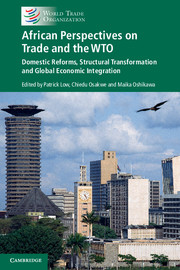 African Perspectives on Trade and the WTO
African Perspectives on Trade and the WTO from Part I - The Future of the Multilateral Trading System: Perspectives from African Policy-Makers and Partners
Published online by Cambridge University Press: 27 October 2016
Lesotho is a landlocked, least-developed economy and a member of the Southern African Customs Union (SACU), the oldest customs union (CU) in the global economy. Forty per cent of the population lives under the poverty line. The economic base is narrow, reliant on the textiles and apparel industry (for 59 per cent of total exports), subsistence agriculture, remittances, regional customs revenue and a degree of manufacturing. The apparel industry and agriculture constitute the backbone of the economy and the main employer. Faced with Lesotho’s geo-economic circumstances and development challenges, the trade and economic response of government has been strategic. Domestic economic policy and structural reforms, accompanied by a policy of economic diversification, trade openness and integration, have been pursued. A trade development plan was carefully designed for active integration into regional and global value chains. These measures have yielded significant welfare gains and economic livelihood dividends. Trade and economic policies are reviewing the next generation of reforms, inter alia in the sectors of mining, electricity and tourism, which face challenges, but have potential for growth. This chapter identifies and discusses the specific steps in the trade policy plan for Lesotho’s successful integration into the textile and apparel value chain, specifically, and more broadly, into a global value chain.
To save this book to your Kindle, first ensure [email protected] is added to your Approved Personal Document E-mail List under your Personal Document Settings on the Manage Your Content and Devices page of your Amazon account. Then enter the ‘name’ part of your Kindle email address below. Find out more about saving to your Kindle.
Note you can select to save to either the @free.kindle.com or @kindle.com variations. ‘@free.kindle.com’ emails are free but can only be saved to your device when it is connected to wi-fi. ‘@kindle.com’ emails can be delivered even when you are not connected to wi-fi, but note that service fees apply.
Find out more about the Kindle Personal Document Service.
To save content items to your account, please confirm that you agree to abide by our usage policies. If this is the first time you use this feature, you will be asked to authorise Cambridge Core to connect with your account. Find out more about saving content to Dropbox.
To save content items to your account, please confirm that you agree to abide by our usage policies. If this is the first time you use this feature, you will be asked to authorise Cambridge Core to connect with your account. Find out more about saving content to Google Drive.